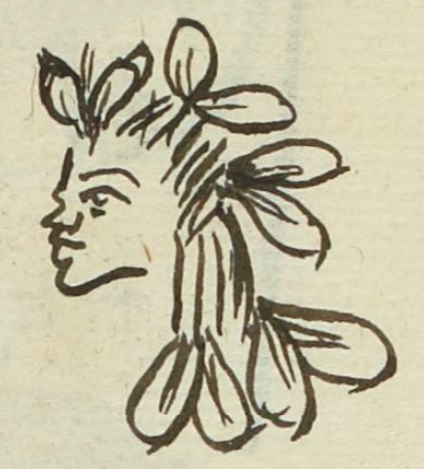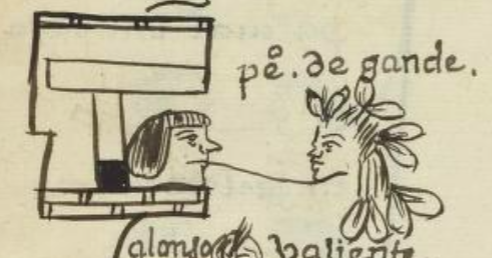de Gante (MH732v)
This black-line drawing of the simplex glyph for the personal name, de Gante (named after a friar) is attested here as pertaining to an elite man. It shows the head of a man in profile, facing toward the viewer’s left. He has long hair and many feathers attached here and there to his hair. Perhaps the thrust of the visuals is that this is a priest, given that priests could have long hair (see examples below). We do not have another example of the way feathers are worked into the hairstyle, but feathers did have a religious significance for Nahuas.
Stephanie Wood
As the Matrícula de Huexotzinco shows, it was not unusual for Nahua elite men to have a Spanish surname by this time (1560). The source of this name was Pedro de Gante (c. 1480–1572), a Flemish friar who was probably present in New Spain when this Pedro de Gante was born. He actually arrived ahead of Los Doce (“The Twelve”) Franciscans, famed as the first missionaries. Pedro de Gante established a school in Mexico City, learned Nahuatl, and published a Christian doctrine in the language, which could explain his popularity with Nahuas, similar to Toribio de Benavente Motolinía. A great many Nahuas took the name Toribio (as a quick search of the name will attest), and there are at least three with the name Motolinia.
Stephanie Wood
1560
Jeff Haskett-Wood
frailes, religión cristiana, nombres de hombres, feathers, plumas

de Gante
Stephanie Wood
Matrícula de Huexotzinco, folio 732v, World Digital Library, https://www.loc.gov/resource/gdcwdl.wdl_15282/?sp=543&st=image
This manuscript is hosted by the Library of Congress and the World Digital Library; used here with the Creative Commons, “Attribution-NonCommercial-ShareAlike 3.0 License” (CC-BY-NC-SAq 3.0).







